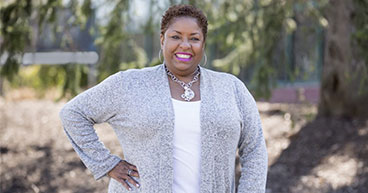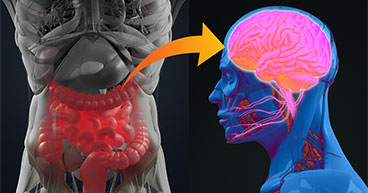
Some cancer patients may experience a mental fogginess or cognitive difficulties once they begin their treatment. While this condition is commonly referred to as “chemo brain,” it may occur with other types of cancer treatments including surgery, radiation therapy, immunotherapy, stem cell transplantation and hormone therapy.
While everyone’s experience is different, the symptoms may be unsettling, debilitating and sometimes last well beyond the conclusion of treatment, depending on many factors.
City of Hope breast cancer survivor Karen R. described her experience with the condition as “scary” and “emotional” as she grappled with the lifestyle changes she had to make to accommodate her cognitive difficulties. Collaborating with a therapist she was able to adjust and learn how to communicate clearly with loved ones and colleagues to help them understand her difficulties. After about a year the mental fog began to lift for Karen, and today she shares her hard-won wisdom:
“Don’t feel guilty, don’t fight it; don’t beat yourself up. Chemo brain might not happen. But if it does, it’s OK.”
Researchers are working to find the possible causes of chemo brain and the best way to prevent or treat the symptoms and to reduce their impact and duration.
This article will explore:
- What are the symptoms of chemo brain?
- What causes chemo brain?
- Other potential causes of chemo brain fog
- How long does chemo brain last?
- Tips for managing chemo brain
If you’ve been diagnosed with cancer and want to get a second opinion on your diagnoses or treatment options, call us or chat online with a member of our team.
What are the symptoms of chemo brain?
Chemo brain may happen at any point during a patient’s cancer treatment journey. It may begin when treatment starts or crop up after treatment has ended. Cancer patients describe it as a decline in mental sharpness, a kind of brain fog or spaciness. The American Cancer Society has identified several common symptoms, including:
- Lapses in short-term memory
- Difficulty remembering names and dates
- Problems concentrating
- Taking longer to finish tasks due to slower, more disorganized thinking and processing
- Trouble remembering common words or finding the right words to finish sentences
- Difficulty in multitasking or doing more than one thing at a time like answering the phone while cooking
- Trouble learning new things
Chemo brain has also been associated with intensifying feelings of anger or frustration, according to the U.S. Centers for Disease Control and Prevention.
Eugene Ahn, MD, Medical Oncologist and Medical Director of Clinical Research at City of Hope Chicago, says symptoms of chemo brain may be a result of a variety of causes including cancer treatments. But he adds: “Based on our clinical experience, I would not be surprised if simply being diagnosed with cancer is enough to cause some of the subjective complaints we commonly see.”
What causes chemo brain?
While researchers have linked multiple cancer treatments and other factors to cognitive issues in cancer patients, it’s widely believed that chemo brain is aptly named.
According to the National Cancer Institute (NCI), the frequently prescribed chemotherapy drug cisplatin is often linked to chemo brain. In a study financed by NCI, researchers at St. Louis University (SLU) have identified a fat molecule called sphingosine 1 phosphate (S1P) that may be affected by cisplatin.
S1P, described by researchers as a “potent signaling molecule” is found throughout the body and helps regulate the immune system and heart function, along with multiple other duties. It’s also been linked to cancer and other diseases, such as multiple sclerosis (MS). Research suggests that SP1 signaling may be coopted Aby cancer cells to recruit healthy cells to help tumors thrive. SP1 molecules have been linked to the formation of glioblastomas, an aggressive and lethal type of brain cancer.
The fat molecule is critical for brain function and helps regulate memory and information processing. Scientists at SLU found that cisplatin may increase levels of S1P in the brain and cause cognitive impairment.
“A significant number of patients who undergo cisplatin treatment are affected by persistent cognitive impairment—[there are] millions of individuals whose daily lives are really impacted,” SLU researcher Daniela Salvemini, Ph.D., tells NCI. “So, if we can find something that can prevent it, it would really be groundbreaking.”
Salvemini and the research team at SLU are exploring whether drugs approved to treat MS that target the S1P molecule may also be used to help treat chemo brain.
Other potential causes of chemo brain fog
The American Cancer Society offers a list of other potential causes to consider outside of cancer specific treatments, including:
- The cancer itself—for example, brain tumors may affect cognition and brain function
- Drugs other than cancer treatments, such as steroids, hormones, anti-nausea or pain medicines
- Other health conditions, such as diabetes or high blood pressure
- Pain
- Tiredness or sleep problems, which are common in cancer patients
- Emotional distress, depression or anxiety
- Old age
- Weakness or frailty
- Infection
- Post-menopausal symptoms
- Nutritional deficiencies
- Alcohol or drug use
Once identified as a potential cause, some of these issues may be directly addressed and treated.
Canadian researchers have concluded that cognitive difficulties may be a result of inflammation that starts during cancer’s progression and occurs before any treatments are given. Research shows that cytokines, released by the body to fight tumor growth, may lead to inflammation in the brain.
Dr. Ahn also notes studies of breast cancer patients have found that younger women, Black women and those who report higher levels of anxiety and depression are more likely to experience greater declines in brain function.
“We also know that depression and anxiety can produce a vicious cycle with the cognitive symptoms since one of the causes of ‘pseudodementia’ (or non-organic cognitive decline) is depression, and breast cancer survivors are at greater risk for depression,” he says.
How long does chemo brain last?
Everyone’s experience with chemo brain is unique with patients reporting cognitive problems ranging from a few months to more long-term issues lasting years.
A 2016 study of 581 breast cancer patients published in the Journal of Clinical Oncology found that impaired cognitive function lasted for six months after the end of chemotherapy treatment.
Sometimes symptoms are subtle and not noticeable to friends or family, and some patients may not even mention them to their care team. When the mental changes are more severe and start to affect daily activities at work or home, interventions may be needed.
Tips for managing chemo brain
Karen R. says she told her care team about her cognitive issues once they started affecting her work and urges patients to share any and all changes during treatment.
“Get comfortable sharing with your care team everything you’re experiencing during treatment. You may think it's a normal sign of aging or that it's a little thing not worth mentioning, but it may signal something more important to your care team,” she advises.
Karen’s team recommended a cognitive therapist who gave her helpful strategies to organize her personal and professional lives, recognize and mitigate her stressors and learn to communicate effectively with friends and caregivers.
“I had never heard of a cognitive therapist until I experienced chemo brain and was directed to a resource for support,” she says.
The therapist also suggested games—downloadable on a phone, tablet or computer—to exercise and challenge her mentally.
A study in the Journal of Psychological, Social and Behavioral Dimensions of Cancer confirmed that such mental training exercises are helpful with the 48 study participants experiencing significant cognitive and memory improvements.
As with many health conditions, lifestyle behaviors may also be beneficial, such as getting regular exercise, eating a healthy diet and avoiding unnecessary toxins like tobacco and alcohol along with meditation, mindfulness and yoga.
“I advise my patients to embrace those lifestyle changes for many more proven reasons such as reduced future cancer risk, with the added benefit that it might help hasten recovery from chemo brain,” says Dr. Ahn, adding that “laughter is good medicine as well as direct psycho-social support sensitive to patient-specific needs.”
Other ways to manage chemo brain include:
Joining a support group since talking to patients facing similar challenges can be encouraging and combat feelings of isolation.
Getting plenty of rest because lack of sleep may impair brain function.
Focusing on one thing at a time since multitasking may seem overwhelming when under the fog of chemo brain.
Being easy on yourself and recognizing that everyone has forgetful days. Most of the time, symptoms will ease, but it may take longer than you expect.
Talking to your doctor about the side effects of cancer treatment and what you can do to help mitigate symptoms.
Getting cognitive rehabilitation, which may involve a cognitive therapist like Karen’s, who may recommend mental exercise or tools like daily planners.
Performing demanding tasks when you feel your energy levels are highest.
Exercising your brain by taking a class or learning a new language.
Following routines and keeping the same daily schedule.
Picking a place for commonly lost objects, like keys, and putting them there each time.
Telling family and friends what is happening and accepting their help and support.
Keeping a diary of when you notice problems and what’s going on at the time, including any medicines taken. This record will also be useful when you talk with your doctor and might help you figure out what prompts your symptoms.
Accepting the problem and being able to laugh about things you can’t control, which may help you cope. Plus, you probably notice your problems much more than others do.
If you’ve been diagnosed with cancer and want to get a second opinion on your diagnoses or treatment options, call us or chat online with a member of our team.



